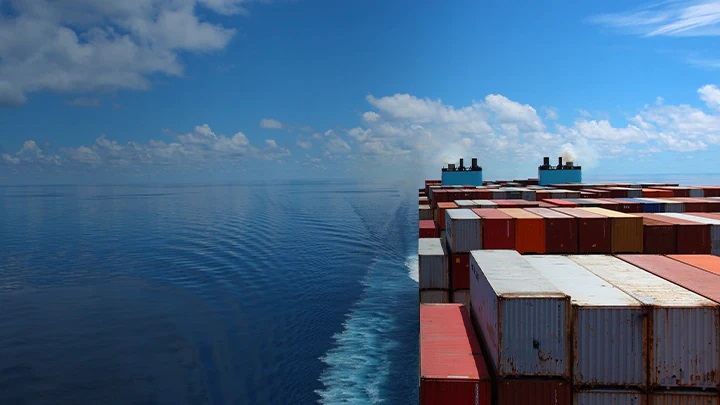With the world turning toward Egypt for the 27th Conference of the Parties of the UNFCCC (COP27), maritime industry leaders are calling for increased ambition to confront the climate crisis.
A joint statement issued during COP27 by organisers of key sector initiatives highlights the need for coordination at all levels to not only reduce emissions, but also to make the maritime industry more resilient and equitable.
“Progress is currently happening through voluntary initiatives and coalitions,” the statement explains, “but we need to urgently accelerate and scale solutions.”
Maritime shipping is the backbone of the world’s logistical supply chains, responsible for around 80% of all global trade and the livelihoods of about 2 million seafarers. However, the industry also accounts for 3% of global greenhouse gas (GHG) emissions – with emissions expected to rise if nothing changes.
COP27 presented an opportunity to reflect on progress while charting an ambitious path forward. The proponents of this call to action (which include the Global Centre for Maritime Decarbonisation, the Global Maritime Forum, the Mærsk Mc-Kinney Møller Center for Zero Carbon Shipping, Resilience Rising, the Aspen Institute’s Shipping Decarbonization Initiative, United Nations Global Compact, University Maritime Advisory Services, the World Economic Forum, and the Climate Champions team) have each undertaken a range of initiatives toward identifying sustainable climate solutions for this sector. But they are also working in close partnership, recognising that achieving true sustainability is a systemic challenge that will require a whole-systems approach.
Success will require that all actors and initiatives in the maritime space play a part in shipping’s transition and must collectively come together to achieve the common goal of zero-emission, resilient and equitable shipping by 2050, at the latest.
Prof Lynn Loo, CEO Global Centre for Maritime Decarbonisation, said: “Shipping enables the global supply chain, and the future for net-zero shipping is green fuels. So production of green fuels needs to scale urgently and at unprecedented rates to meet the needs of the industry. We must actively work together – with a whole-of-systems approach – to lower barriers for adopting green fuels and green technologies. GCMD is working closely with industry and regulators to help shape guidelines and policies, conduct pilots and demonstrations, share and exchange knowledge, and access and engage stakeholders, in order to address technical and operational gaps, define safety envelops, and establish competency frameworks so green fuels can be readily deployed when they become available.”
One key step will be sending strong supply and demand signals to support sustainable solutions.
Bo Cerup-Simonsen, Mærsk Mc-Kinney Møller Center for Zero Carbon Shipping CEO said: “Developing green corridors is instrumental in activating industry first-movers across the maritime value chain and demonstrating solutions. Our green corridor blueprints and projects in Northern Europe and Chile can be used as industry references for new project setups and scalable business models. Decarbonising shipping requires new ways of collaborating. We need coordinated action from public and private sectors to mature viable pathways and get the transition going.”
Katharine Palmer, shipping lead for the Climate Champions, said that: “transitioning the sector is more than just decarbonising. It also is about a just and equitable transition. This is why we need a whole-systems approach with individual actors, initiatives and coalitions working with each other in partnership to create the change needed.”
Seth Schultz, CEO Resilience Rising, said: “Enhancing the resilience of ports can unlock benefits not only for the maritime sector but also for port communities and coastal habitats. Resilience Rising is pleased to be partnering with leading organisations to deliver this change through a whole-systems approach.”
Margi Van Gogh, Head, Supply Chain & Transport Industries, World Economic Forum, said: “Cohesive industry and government action, harnessing effective transformational change levers that incentivise adoption and scaling of new technologies, to accelerate reduction of emissions from shipping, is needed. Only conscious action now, this decade, can secure sustainable maritime sector transition pathways and limit global warming to 1.5 degrees Celsius. Future generations will not reward us for plans, only for the concrete actions we take.”
Johannah Christensen, CEO, Global Maritime Forum said: “”To have a climate-smart and sustainable maritime sector, as well as achieve full decarbonisation of international shipping and transition to zero-emission fuels, we ultimately need coordinated efforts and tangible actions from the industry, organisations, and governments.”
Ingrid Irigoyen, Director Aspen Institute Shipping Decarbonization Initiative and facilitator of Cargo Owners for Zero Emission Vessels (coZEV), added: “We’re encouraged to see increased engagement and ambition for decarbonisation from industry actors across the value chain, including the rapidly growing demand signal being sent by cargo owners through coZEV. Now we need policy makeraction and leadership from key international regulators to step up and match the industry’s ambition to create the right conditions for a smooth, viable, rapid, and equitable transition.”
Christensen concluded: “The whole-system approach is the key for success.”
These leaders say they are committed to taking such an approach. They call on other stakeholders and governments to do the same: to coordinate their ambition, collaborate in their action, and adopt the bold policies needed to unlock a sustainable future for the maritime sector and the planet.



